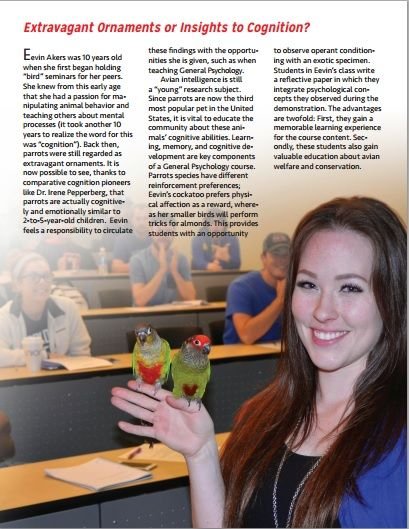Academic Research
My research explored the interactions of cognitive biases, individual differences, content design, and accessibility barriers in learning experiences. What's most important, and how can we improve it?
Research Topics
-

Learning Experience
Static versus interactive learning methods
Synchronous versus asynchronous learning
Instructor and team variables in learning success
Multimedia design best practices
-

Metacognition
Notetaking methods & barriers
Learning & study strategies
Judgments of familiarity, learning, confidence, & accuracy
Metacognitive monitoring as a training tool
Cue overload effects
-

Language
Monolingual versus bilingual thinking
Role of linguistic relativity, fluency, social dynamics, & cultural influences in judgments
Reading comprehension strategies
Automated text analysis methods
Natural language processing
-

Information Architecture
Contextual influences on categorization
Hierarchical organization in natural learning environments
Propositional network modeling
Semantic network modeling
-

Motivation
Role of intrinsic versus extrinsic rewards in performance
Attitudinal and preference assessments
Background knowledge in judgments, decision-making, and behaviors
Value systems as motivators
-

Equity & Accessibility
Neurodiversity accommodations in organizational and learning environments
Hispanic and first-generation perspectives on workplace and educational success
Accessibility needs and barriers in digital and physical environments
International considerations in group learning environments
Scholarship
-
Dissertation
The effects of interpolated lectures, self-testing, and notetaking on learning from a science video lecture.
-

Master's Thesis
Notetaking modality and student learning: Computer, paper-pencil, or listening?
-

Keynotes
Jennings, E. (November, 2022). (Keynote Speaker) From brain science to boss battles: An experimental psychologist's journey into games user experience research. University of Illinois Annual Playful by Design Symposium, Champaign, IL.
Conference Presentations
*denotes junior researcher project with my mentorship
Pittman, J., Taraban, R., & Jennings, E. (April 2020). Noting the effectiveness of notetaking: Testing immediate and delayed recall. Southwestern Psychological Association, Albuquerque, NM.
*Cancemi, A., & Jennings, E. (May 2018). Notetaking method, encoding effects, and proactive interference. Psychology Undergraduate Research Conference, Los Angeles, CA.
*Metwally, A., & Jennings, E. (May 2018). A comparison between interpolated and post-lecture testing on type of information retained after a delay. Psychology Undergraduate Research Conference, Los Angeles, CA.
*Cancemi, A., & Jennings, E. (March 2018). Does laptop notetaking reduce proactive interference during lecture? Texas Tech University Undergraduate Research Conference, Lubbock, TX.
*Swift, T., & Jennings, E. (March 2018). Some like it r(t)ough: The relationship between perceived content difficulty, mental effort, and interest in a neuroscience lecture. Texas Tech University Undergraduate Research Conference, Lubbock, TX.
*Birdsong, B. B., & Jennings, E. (March 2018). Absolutely interested: Individual differences in subjective content familiarity and interest predict absolute accuracy when learning from a science video lecture. Texas Tech University Undergraduate Research Conference, Lubbock, TX.
*Metwally, A., & Jennings, E. (March 2018). The ‘senioritis’ effect: Completed course credits predict mind-wandering during lecture. Texas Tech University Undergraduate Research Conference, Lubbock, TX.
Jennings, E., Taraban, R., Paniukov, D., Schumacher, J., *Dominguez, S., & *Parker, T. (April 2015). When teachers lecture, what do students recall with and without notes? Southwestern Psychological Association, Wichita, KS.
Jennings, E., Schumacher, J. R., & Taraban, R. (November 2016). Studying lecture notes increases overconfidence as measured by JOLs and recall scores. Psychonomic Society, Boston, MA.
Jennings, E., & Serra, M. J. (February 2015). Is there a real reason to ban laptops in classrooms? Advanced Teaching and Learning Conference, Lubbock, TX.
Jennings, E., & Taraban, R. (November 2014). Recall-based notetaking aided by transcription fluency. Psychonomic Society, Long Beach, CA.
Jennings, E., & Taraban, R. (May 2014). Note-taking in the modern college classroom: Computer, paper and pencil, or listening? Midwestern Psychological Association (MPA), Chicago, IL.
Jennings, E., & Taraban, R. (April 2014). Note-taking benefits college students. Southwestern Psychological Association (SWPA), San Antonio, TX.
Paniukov, D., Taraban, R., Schumacher, J., & Jennings, E. (March 2014). Text segmentation and the testing effect. Graduate Student Research Poster Competition, Texas Tech University.
Marshall, P. P., Chang, J., Zeng, X., Jennings, E., & Donato, F. (May 2013). The commonality of religious and aesthetic experiences. Midwestern Psychological Association, Chicago, IL.
Jennings, E., & Taraban, R. (October 2013). Benefits of notetaking vs listening. College Academic Support Program Conference (CASP), Amarillo, TX.
Taraban, R., & Jennings, E. (October 2013). Learning from expository text. College Academic Support Program Conference (CASP), Amarillo, TX.
Jennings, E., & Taraban, R. (April 2013). Absence of testing effect in text recall: It pays to study. Southwestern Psychological Association (SWPA) Conference, Fort Worth, TX.
Jennings, E., & Taraban, R. (March 2013). Notetaking method in the college classroom: Computer, paper and pencil, or listening? Graduate Student Research Poster Competition, Lubbock, TX.
Jennings, E., & Taraban, R. (November 2012). Absence of a testing effect in immediate and delayed recall. Psychonomic Society, Minneapolis, MN.
Jennings, E., & Taraban, R. (April 2012). Text coherence and the testing effect. Southwestern Psychological Association (SWPA), Oklahoma City, OK.
Jennings, E., & Taraban, R. (March 2012). Effects of coherence and multiple tests on expository text recall. Graduate Student Research Poster Competition, Lubbock, TX.
Gallery
-

Presenting my research on individual differences in learning experiences.
-

Chatting with some fellow researchers at a learning conference. Students like it when female professors curse!
-

Doing fMRI research was an expensive way to discover that I did not want to do fMRI research.
-

Doing a conference presentation about metacognitive learning strategies.
-

A thumbnail from a video featuring my research program.
-

Look at my ~ entire ~ poster about how notetaking makes people overconfident!

